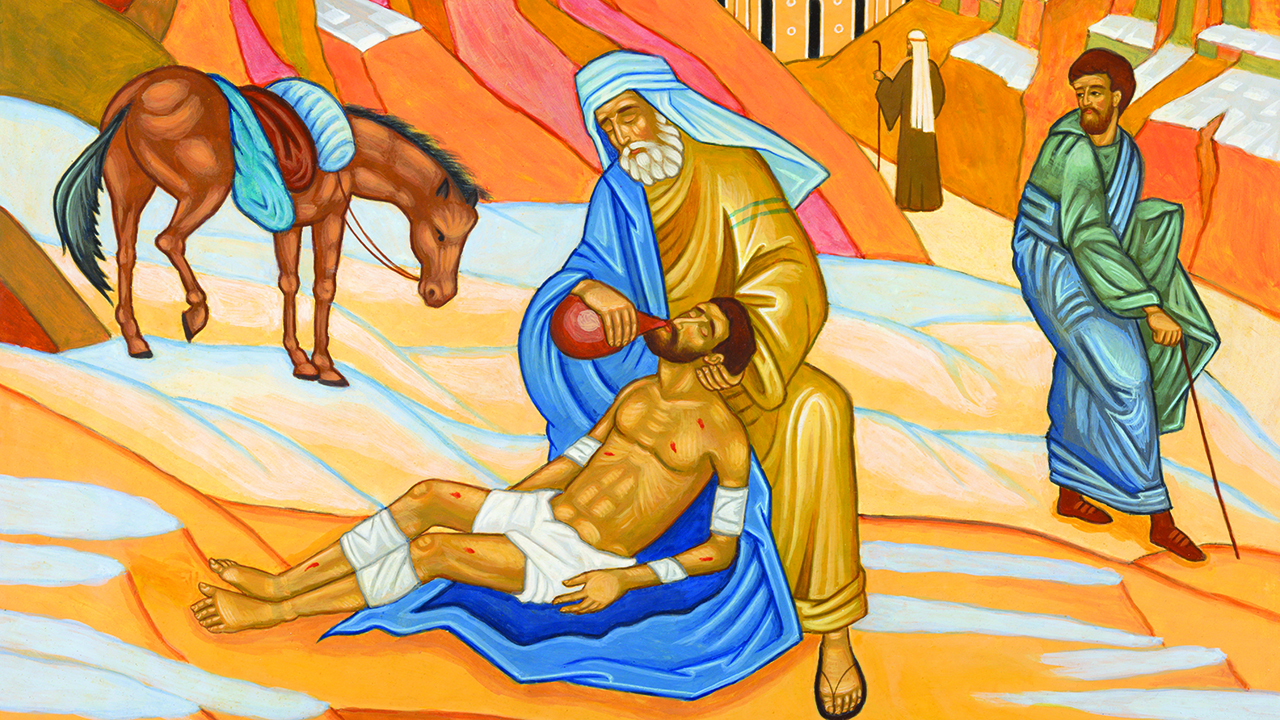
The Gospel with today’s two biblical readings again offers us the opportunity to be in the school of Jesus the Divine Teacher. The Gospel episode actually relate a dialogue in the “scholastic” manner customary in the Judeo-Rabbinic tradition, between a rabbi-leader of the group (who is Jesus in this case) and one of his questioners (who is ironically “a scholar of the [Jewish] Law”). It turns out to be a very interesting conversation to be followed carefully in order to (re)discover the depth of the parable of the Good Samaritan told on the occasion, and especially to refresh some fundamental points for our lives as missionary disciples of Jesus.
1. Human Restlessness for Eternal Life and the Gift of God’s Saving Word
The “scholastic” dialogue starts with a fundamental question with which “a scholar of the law” wanted to “test Jesus”: “Teacher, what must I do to inherit eternal life?” Despite the possible provocative intention, the question nevertheless expresses a deep and legitimate restlessness that circulated not only in the debates among the rabbis and generally among Jews in Jesus’ time, but also in the hearts of men and women of all times.
Therefore, with regard to this legitimate “inquiry,” Jesus, in his usual magnanimity, seen before in the face of the rejection of some Samaritans, did not mind the intention of the questioner (to avoid falling into an unnecessary controversy), but entered into the dialogue in order to let God’s authoritative and genuine teaching shine through in everyone, once and for all. Precisely in the style of rabbinical schools, He did not immediately respond with a “prepackaged” answer, but with two counter-questions: “What is written in the law? How do you read it?” These are two complementary questions: the first concerns the content of God’s teaching (the ‘what’), while the second, even more importantly, concerns the personal interpretation and practice derived from it (the ‘how’).
Jesus’ behavior actually underlines the fundamental theological/spiritual point, as He himself declared, “Do not think that I have come to abolish the law or the prophets. I have come not to abolish but to fulfill” (Mt 5:17).
Therefore, any inquiry about eternal life with God will find its proper and precise answer in the Law, in Hebrew Torah, that is, the Teaching (as a whole), which God gave to Israel on Mount Sinai. It is precisely his revealed Word for salvation, which in its richness, immediacy, and accessibility, is extolled and recommended by God himself through Moses: “For this command which I am giving you today is not too wondrous or remote for you. No, it is something very near to you, in your mouth and in your heart, to do it” (Dt 30:11,14). The Law/Torah is the concrete expression of God’s mercy for His People on the way, His Word that came close to every man and woman pointing out the ways of salvation.
2. Loving God and Neighbor: the Key to Eternal Life
With this in mind, when the scribe recalled the twofold love for God and neighbor, which is recommended in the Law as a necessary condition as well as a foundation for eternal life, Jesus himself said with authority, “You have answered correctly; do this and you will live.” The Word of God in the Law found in Jesus, the incarnate Word of God, confirmation, authoritative interpretation, and its complete fulfillment. Thus, in Jesus’ person and his mission on earth, the Word of God came even closer, more concrete, and more accessible for eternal life. It is indeed neither in heaven nor beyond the sea, but it is “is something very near to you, in your mouth and in your heart.”
Henceforth, we know with certainty that those who practice love for God with their all being, heart, soul, strength, mind, and love of neighbor will have eternal life because, using the inspired words of St. John the Apostle, “God is love, and whoever remains in love remains in God and God in him” (1Jn 4:16). On the other hand, following the teaching of Jesus, St. Paul the Apostle clearly states, “Love is the fulfillment of the law” (Rm 13:10; cf. Gal 5:14 “For the whole law is fulfilled in one statement, namely, ‘You shall love your neighbor as yourself.’”) You can continue the sentence by stating that fullness of love is precisely Jesus, because, as we heard in the second reading, “He is the image of the invisible God” (Col 1:15) and “for in him all the fullness was pleased to dwell” (Col 1:19). Those who love, live like Him, with Him and in Him.
3. “Go and do likewise.” A parable for a Mission that Exceeds All Limits
In the face of Jesus’ clear answer, the reaction of the scribe who wanted to “justify” himself is surprising. Why? (Perhaps for complicating something so simple!). Everything is clear in the twofold commandment of love, but the knot lies in the understanding of the concept of “neighbor,” which in the Law itself means rather “the compatriot (Jew),” one of the same Jewish people or religion. The clarification requested by the scholar of the Law “And who is my neighbor?” has reason to be and, in fact it was also a propitious occasion to receive a revolutionary teaching from Jesus, through the beautiful parable of “the Good Samaritan.”
The man left half-dead described in the parable was most likely a Jew or at any rate certainly not a Samaritan (because he “went down from Jerusalem”). However, that did not stop the Samaritan passerby from having compassion for him and caring for the needy man he met on the road, thus going beyond any existing ethnic or religious separation. Note Jesus’ concluding question: “Which of these three, in your opinion, was neighbor to the robbers’ victim?” Jesus does not try to solve the problem, to define “who is my neighbor,” as the scribe asked, but rather points the way to become a neighbor for others in need, without being conditioned by anything!
In fact, it is curious to see that the scholar of the Law in his reply simply noted, “The one who treated him with mercy,” almost as if he wanted to avoid mentioning the Samaritan. Nevertheless, this was enough for Jesus to command him to “Go and do likewise,” to fulfill the commandment of love of neighbor in a genuinely godly way. This perspective then becomes totally universal and then “active,” just like that of the golden rule Jesus himself taught the disciples as a summary of the whole Law and Prophets, “Do to others whatever you would have them do to you” (Mt 7:12)
Reflecting on Christ’s recommendation to the disciples to be his witnesses “to the ends of the earth,” Pope Francis states in his Message for World Mission Sunday of the year 2022:
No human reality is foreign to the concern of the disciples of Jesus in their mission. Christ’s Church will continue to “go forth” towards new geographical, social and existential horizons, towards “borderline” places and human situations, in order to bear witness to Christ and his love to men and women of every people, culture and social status.
He adds in this regard:
In this sense, the mission will always be missio ad gentes, as the Second Vatican Council taught. The Church must constantly keep pressing forward, beyond her own confines, in order to testify to all the love of Christ. Here I would like to remember and express my gratitude for all those many missionaries who gave their lives in order to “press on” in incarnating Christ’s love towards all the brothers and sisters whom they met.
“Doing likewise,” like the Good Samaritan in the parable, is an authentic following of Jesus, who is the incarnate Word and Compassion of God on mission. It is no coincidence that in Luke’s Gospel, the specific verb “to fill with compassion” (splangchnizomai), in addition to recurring in the parable of the prodigal son to underscore the father’s reaction to seeing his son return (cf. Lk 15:20), is still only used to describe Christ’s own feeling when confronted with the weeping of the widow of Nain at the loss of her only son (cf. Lk 7:13). Therefore, the Tradition of the Church rightly sees in the Good Samaritan the figure of Christ who approached every man and woman to care for them and to give himself for the salvation of all.
Let us therefore pray that all disciples of Christ may continue the mission of their divine Master, especially in these turbulent times when, as Pope Francis says, the Church has now become a “field hospital” in the world. Mary, Mother of Christ, Mother of Mercy and Compassion, pray for us. Amen.


